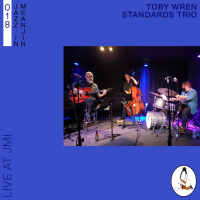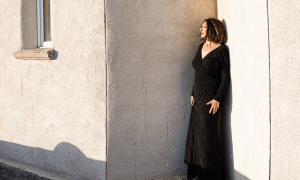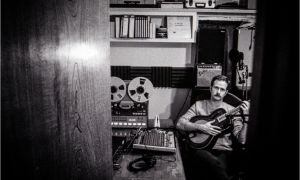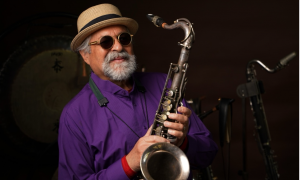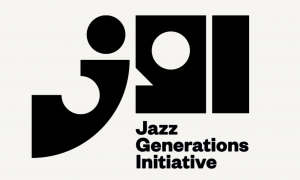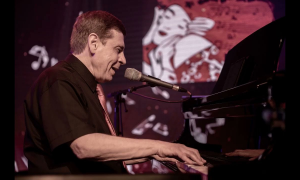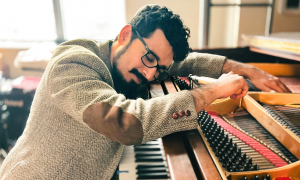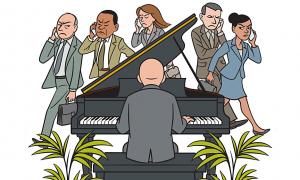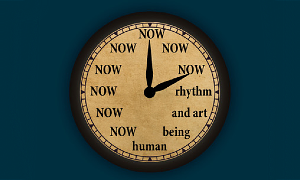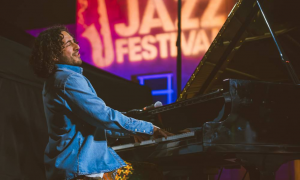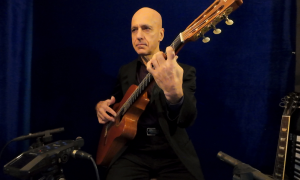As host of the 2008 Olympic Games, Beijing is rapidly becoming one of the world's 'must- see' destinations. Beijing intends to set an example for how the Olympic agenda in the 21st century can be implemented and the Games have given China the greatest opportunity to showcase itself to the rest of the world. This festival of sport showcases the greatest, fastest and strongest competitors in the world. China is striving to create the most memorable Games-time experience for spectators and athletes alike.
Annual International Modern Music Feast - Ninegates Jazz Festival
28 May 2008
Once banned as a decadent Western music propagated by reactionary class enemies, China has embraced jazz to the point of organizing a festival on the doorstep of the Forbidden City.
The Beijing Nine Gates Jazz Festival, held from May 25-31, 2007, brought thousands of mostly young fans to see 18 foreign and Chinese jazz acts perform at a concert hall a stone's throw from the 600-year-old ancient Chinese palace.
Beijing Music Festival
The Beijing Music Festival has already become a significant date for Beijing's music fans. Held in late fall, the festival is staged at various venues throughout the capital. Each year more than 1,000 domestic and foreign musicians take part in approximately 30 performances, ranging from individual vocalists and instrumentalists to symphony orchestras.
Jazz swings and bops its way to the most unlikely places, even the command center of the People's Republic of China. It's a chilly November day, and I'm at the sound check for opening night of Beijing's week-long festival celebrating America's indigenous music. Adorned with blue and gold insignias and gold tassels, the music stands are spread across the stage as the Chinese big band members, most wearing black leather jackets, black T- shirts and black slacks, unleash a cacophony of sound as they warm up on their trumpets, trombones and saxophones. Behind them is a huge sign with Jazz 08 written in hot pink.
These preliminaries could be at a jazz concert anywhere. But this is communist China, after all, where people are only beginning to utter the J-word because the music is officially frowned upon as a pollutant of Western culture. The young pianist pounces on the keys to cue the band's chug into “Take the A Train," the Billy Strayhorn composition made famous by Duke Ellington's band, while gray-around-the-temples conductor Dieter Glawischnig shouts sternly, yet encouragingly, in his thick German accent, “More sving, more sving!"
“We only worked together on this set for two weeks, so don't be too critical," Glawischnig tells me. He conducts the Hamburg radio band NDR and performs in the Ensemble for New Improvised Music, which is also playing at the festival. Today he's tutoring these Chinese jazz neophytes in the fine art of swing. He informs me that the band will perform two other Ellington classics, Herbie Hancock's “Maiden Voyage," Glenn Miller's “In the Mood" and a Chinese folk tune arranged for a big band especially for the show. “It's called 'Evening Song.' It was President Jiang Zemin's favorite when he was a child."
That's a politic move if you want to play jazz in Beijing. It's an even more strategic repertoire decision if you're the People's Liberation Army Big Band, which, under Glawischnig's direction, makes its jazz debut tonight. As improbable as it seems in a country notorious for its clampdowns on anything remotely related to free speech (in the case of jazz, free improvisation), the adventurous Beijing International Jazz Festival.

Tonight's show, like most of the concerts this week, is already sold out. Later this evening the 1,400-seat house will be filled with the emerging middle class of Chinese citizens, who are reaping the benefits of the influx of Japanese and American capital jump-starting the Chinese economy. But tonight especially, it's a given that the audience will also include high-ranking soldiers in the PLA, who will scrutinize the big band's music, and officials from the Ministry of Culture, which rubber-stamps the festival each year. These cultural guardians (read: police) will make sure nothing gets too far out of hand.
I'm “unofficially" here covering this best-kept secret of the jazz world for Down Beat magazine. A point of clarification: I'm on assignment to write about the festival for DB, but in the eyes of the Chinese governmental bureaucracy, I'm a tourist, not a journalist. In fact, according to my visa, I'm a road manager for the Jon Jang Sextet, one of the two American bands performing here. As Jang told me back in San Francisco, identifying oneself as a journalist immediately raises a red flag with Chinese officials. And, he added, it's not the right red flag.
A short cab ride away, Beijing's top jazz club, the fully lit CD Cafe, is also hopping. This venue is more like something you'd find at a university in the urban United States. The horseshoe-shaped bar dominates the middle of the house, which seats 150 to 200 people. Again, the club-goers are in their 20s and early 30s. The walls of the club are filled with 2-feet-by-4-feet photos from old jazz album covers. There's Miles Davis, John Coltrane, Dexter Gordon, Billie Holiday, Dizzy Gillespie.
This is where I meet 37-year-old Chinese jazz pioneer Liu Yaun, who leads a band of young Chinese musicians through fake books of mainstream bebop standards every Friday and Saturday night. Liu, a fine tenor saxophonist who has performed at all five of the city's festivals, is as close to a jazz star as you get in Beijing. Before he takes the stage for his second set, a young woman asks him if she can have her boyfriend take a picture of the two of them. Shyly, Liu agrees, stands next to her and smiles for the camera. Back onstage, he blows his sax with deep soul and big swing. The audience is rapt. There's drinking, smoking, but no talking -- the kind of concentrated listening atmosphere that jazz requires.
Classically trained on the suona, a Chinese wind instrument, Liu was first exposed to jazz when he toured Romania with the Beijing Opera. Liu, who was then 18, recalls, “I saw a group playing jazz in a bar and thought: Wow, what is that? I was immediately drawn to the saxophone." (Even though Liu knows enough English for basic conversation, I ask for translation help from filmmaker Victor Huey, who's in Beijing working on a documentary on the burgeoning music scene.)
When Liu returned home, China was beginning to crack open its doors to the West. But the only music filtering into Beijing was John Denver and disco. Liu borrowed money to buy a Chinese-made sax and picked up licks from pop songs until he heard a Grover Washington Jr. cassette. But his best jazz education came jamming at hotel bars in Beijing with embassy-based jazz amateurs, listening to music that friends in the U.S. sent to him and then touring the States with Cui Jian, the controversial Chinese rock star who has become Beijing's Bruce Springsteen. “We were a rock band, but every night after our shows we'd go to jazz clubs. In New York, we went to the Village Vanguard, the Blue Note and Small's."
Liu, who cites Coltrane, Branford Marsalis and Joshua Redman among his favorites, says the impact of Beijing's jazz festival has been immense. He notes that in addition to the concerts, the festival encourages visiting band members to participate in master classes at the Central Conservatory of China, the Beijing MIDI School and the New Institute for Contemporary Music. “Before, young people used to go to discos. Now they go to the jazz bars to listen to the music. The festival has established jazz in Beijing." “Jazz has become hip here," says Beijing Jazz Festival co-coordinator Robert van Kan, a burly guy in his 30s with a flowing mane of blond hair, who works as a cultural exchange attach at the Royal Netherlands Embassy. We're sitting at a tiny restaurant not far from Poly Plaza. He brusquely orders enough food to feed the entire PLA band and we do our best to finish the feast spread before us: a cold cucumber dish, a greasy but delicious eggplant plate, a spicy shrimp concoction, a chicken-with-peanut-sauce delicacy and a couple of bowls of rice on the side with sweet Chinese beer to wash it all down.
“Jazz has become hip here," says Beijing Jazz Festival co-coordinator Robert van Kan, a burly guy in his 30s with a flowing mane of blond hair, who works as a cultural exchange attach at the Royal Netherlands Embassy. We're sitting at a tiny restaurant not far from Poly Plaza. He brusquely orders enough food to feed the entire PLA band and we do our best to finish the feast spread before us: a cold cucumber dish, a greasy but delicious eggplant plate, a spicy shrimp concoction, a chicken-with-peanut-sauce delicacy and a couple of bowls of rice on the side with sweet Chinese beer to wash it all down.
During dinner, van Kan proudly talks about the festival, which has been growing steadily since its humble beginnings as a one-night affair in 1993. Originally a rock'n'roll fan who got turned on to jazz appreciation through Miles Davis and Herbie Hancock fusion, van Kan's been on board since the second year of operation. “In the beginning, the crowds at the festival consisted of expats and foreigners. Now Chinese dominate the audience. The cultural elite and arts avant-garde communities come to the shows as well as regular Chinese people from the emerging middle class. They're really into it."
As for government reaction, van Kan smiles wryly. “The import of Western culture into China is seen by conservative groups as undermining social stability. Jazz is allowed, but not actively promoted by the authorities. Politically, it's a sensitive subject. So we're careful in what we present."
Jazz was prohibited during the Cultural Revolution -- branded decadent, spiritually contaminating and, worst of all, bourgeois. Even though Sino-U.S. relations began to thaw in the early '80s, there's been very little exposure to the music. According to festival founder Udo Hoffmann, at the time of the first shows, Chinese awareness of jazz was a blank slate.
“Deep knowledge of jazz didn't exist here," says Hoffmann, a German citizen who has lived in China for eight years and today works for the Beijing YiRen Cultural Arts and Exchange Center, an arm of the Chinese-owned YiRen advertising agency, which serves as the Chinese sponsor. He's backstage making sure every sound and lighting detail has been taken care of before Betty Carter's concert, the festival finale. “Jazz is so difficult to define because it encompasses so much, from Dixieland to free. So we figured if we were going to present a festival we needed to educate people by showcasing the full spectrum. This is a new world of music for the Chinese. They're motivated to hear more even if they don't like everything. China is changing and developing. Jazz is part of that."
Tall, thin, dark-haired, gregarious and full of nervous energy, Hoffmann was inspired to present jazz shows when he heard rocker Cui Jian, a classically trained trumpeter, trying to figure out how to play the classic jazz tune “Take Five." “I thought young Chinese musicians would really like the taste of jazz," says Hoffmann, who was working for the Goethe Institute at the time. He contacted friends at embassies to help import acts from their countries for a low-key four-group program.
Hoffmann remembers the reaction well. “The audience was stunned. It was like they were breathing something new. Some people got a headache, others felt it was unhealthy. Still others felt it was capitalist pollution. But the Chinese musicians loved it. They've become the offspring of the jazz festival. Each year another new band crops up. The jam sessions with visiting groups in the clubs have been invaluable. The Chinese musicians get to touch these artists, to feel them, to learn from them how to express their feelings, to dialogue with these guys. It's been amazing."
Hoffmann hopes that Chinese jazz, now in its nascent stage, will eventually reflect Beijing. “The Chinese music tradition is rich, long and full of treasures. Jazz would be a wonderful vehicle to further explore this. Not all kinds of jazz will work in China. Chinese culture as reflected in its painting and calligraphy is attracted to the abstract. My guess is the same thing will happen with jazz. But right now, the Chinese jazz musicians are just scratching the surface."
For more information contact All About Jazz.






